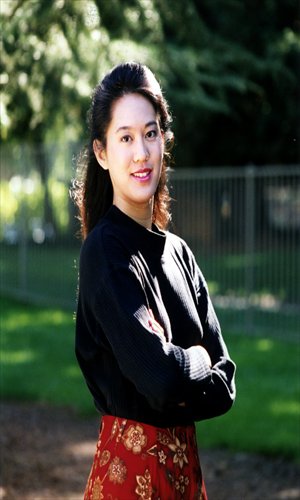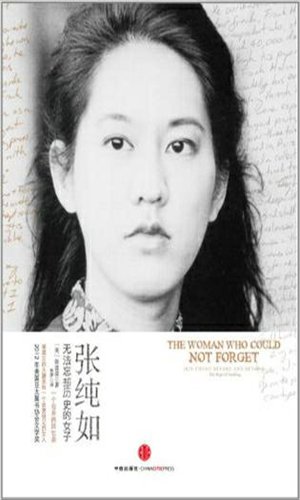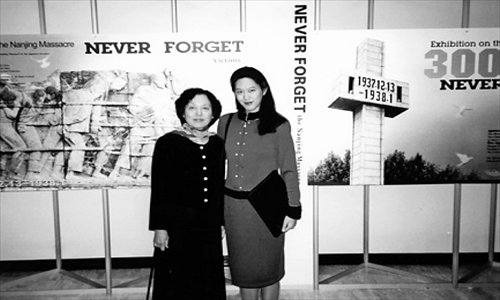HOME >> METRO SHANGHAI
The power of one
By Li Yuting Source:Global Times Published: 2012-5-20 18:30:10
Back in 1997, when Iris Chang (1968-2004) penned the history of the Nanjing massacre during World War II - an often overlooked event of the war - the book shocked the English-speaking world and stayed on the New York Times bestseller list for more than five months.

A sufferer from depression, the Chinese-American writer and historian Iris Chang commits suicide in 2004. Photos: CFP and Courtesy of China Citic Press
In 2011, seven years after Iris Chang's suicide, her mother Ying-Ying Chang has written her own book entitled The Woman Who Could Not Forget: Iris Chang Before and Beyond the Rape of Nanking. It is a touching memoir which reminisces about her daughter's 36-year life. It details everything from her happy childhood, her dedication to writing and journalism, her three books and the depression that finally claimed her life. The book also includes many personal letters the daughter wrote to family members.
The book was awarded the 2012 Asian/Pacific American Librarians Association (APALA) Award for literature in the adult non-fiction category. And the Chinese edition of The Woman Who Could Not Forget has been published by China Citic Press.
"I spent six years on the book, and I want readers to remember how Iris lived, not how she died," said Ying-Ying Chang at a lecture hosted by Fudan University last week. Together with Iris Chang's father Shaojin Chang, the couple shared memories of their daughter, who was also a historian and human rights activist.

The Woman Who Could Not Forget: Iris Chang Before and Beyond the Rape of Nanking
Eager for knowledge
Iris Chang once said "words are eternal" and that "books are the ultimate way for writers to achieve immorality." She did exactly that with Thread of the Silkworm (1995), The Rape of Nanking (1997) and The Chinese in America (2003).
The daughter of Chinese university professors who emigrated to the US in the 1960s, Iris Chang was born in Princeton, New Jersey and received her bachelor's degree in journalism from the University of Illinois at Urbana-Champaign in 1989. Her time in school saw her actively engaging on campus in newspaper writing and even contributing stories to the Chicago Tribune, Newsweek and the New York Times.
Iris Chang was an avid reader and her mother vividly recalls her borrowing dozens of books at a time from the library and feeling rapturous when she found a favorite title at a secondhand book market. She often stayed awake until the early hours reading. "Books made Iris feel free, and helped her forget her pain and unhappiness," said Ying-Ying Chang.
Ying-Ying Chang paints a picture of her daughter as a sensitive, expressive, passionate and hard-working person and their relationship was especially close. At every major holiday festival, especially Mother's Day, she would receive a handmade card from her devoted child.
Eager for knowledge
Iris Chang once said "words are eternal" and that "books are the ultimate way for writers to achieve immorality." She did exactly that with Thread of the Silkworm (1995), The Rape of Nanking (1997) and The Chinese in America (2003).
The daughter of Chinese university professors who emigrated to the US in the 1960s, Iris Chang was born in Princeton, New Jersey and received her bachelor's degree in journalism from the University of Illinois at Urbana-Champaign in 1989. Her time in school saw her actively engaging on campus in newspaper writing and even contributing stories to the Chicago Tribune, Newsweek and the New York Times.
Iris Chang was an avid reader and her mother vividly recalls her borrowing dozens of books at a time from the library and feeling rapturous when she found a favorite title at a secondhand book market. She often stayed awake until the early hours reading. "Books made Iris feel free, and helped her forget her pain and unhappiness," said Ying-Ying Chang.
Ying-Ying Chang paints a picture of her daughter as a sensitive, expressive, passionate and hard-working person and their relationship was especially close. At every major holiday festival, especially Mother's Day, she would receive a handmade card from her devoted child.

Iris Chang (right) poses for a photo with her monther Ying-Ying Chang.
Family fates
"We encouraged Iris to speak Chinese at home, and told her lots of stories about China; we wanted her to understand her roots," said Ying-Ying Chang. And from time to time, Iris Chang would question her parents about the experiences of her grandparents and their fleeing from Nanjing just before the city was overrun by the Japanese army.
"I think the stories of our family really influenced Iris' research on the topic of the Nanjing massacre," Ying-Ying Chang told the Global Times. She added that Iris Chang was shocked by photos of the massacre, and was appalled by the almost total lack of information about this tragedy, a fact that made her determined to conduct her own research.
"Iris always reminded herself that she was writing for the preservation of history," said Ying-Ying Chang. "She considered that everyone dies twice: the first time when their physical body expires; and the next time when their name is spoken for the very last time. This is why she shed so many tears at the fact that these people had been forgotten so quickly. I felt so worried for Iris because she suffered both mentally and physically while writing The Rape of Nanking. I asked her one time whether she felt an absolute need to finish the book and she said 'sure, mom. What I am suffering now is far less than what happened to these victims. As a writer I want to give a voice to those who never had one, and to rescue them from obscurity.'"
After The Rape of Nanking was published, Iris Chang was also the subject of attacks from right-wing pressure groups in Japan, who have continually contested the narrative of the massacre. They sought to malign Iris Chang's character and her intentions. She even received anonymous letters containing bullets. "Iris never felt any regret for writing the book, and neither do we. What we regret is not protecting her enough. However, I don't think the book and subsequent criticism were the real reasons for her suicide. I think it was the side effects caused by the psychotropic medicine she was using during the last three months of her life," Ying-Ying Chang added.
The power of one
In Ying-Ying Chang's eyes, her daughter was not only a writer and historian, but also an outstanding public speaker and human right activist, who spared no effort in speaking out for justice and human rights.
Both during the interview, and at the Fudan lecture, Ying-Ying Chang continually emphasized the notion of "The Power of One," a phrase Iris Chang once used herself during a speech. She said at the time: "Please believe in 'The Power of One.' One person can make an enormous difference in the world. One person - actually, one idea - can start a war, or end one, or subvert an entire power structure. One discovery can cure a disease or spawn new technology to benefit or annihilate the human race. You, as just one individual can change millions of lives. Think big. Do not limit your vision and do not ever compromise your dreams or ideals."
Family fates
"We encouraged Iris to speak Chinese at home, and told her lots of stories about China; we wanted her to understand her roots," said Ying-Ying Chang. And from time to time, Iris Chang would question her parents about the experiences of her grandparents and their fleeing from Nanjing just before the city was overrun by the Japanese army.
"I think the stories of our family really influenced Iris' research on the topic of the Nanjing massacre," Ying-Ying Chang told the Global Times. She added that Iris Chang was shocked by photos of the massacre, and was appalled by the almost total lack of information about this tragedy, a fact that made her determined to conduct her own research.
"Iris always reminded herself that she was writing for the preservation of history," said Ying-Ying Chang. "She considered that everyone dies twice: the first time when their physical body expires; and the next time when their name is spoken for the very last time. This is why she shed so many tears at the fact that these people had been forgotten so quickly. I felt so worried for Iris because she suffered both mentally and physically while writing The Rape of Nanking. I asked her one time whether she felt an absolute need to finish the book and she said 'sure, mom. What I am suffering now is far less than what happened to these victims. As a writer I want to give a voice to those who never had one, and to rescue them from obscurity.'"
After The Rape of Nanking was published, Iris Chang was also the subject of attacks from right-wing pressure groups in Japan, who have continually contested the narrative of the massacre. They sought to malign Iris Chang's character and her intentions. She even received anonymous letters containing bullets. "Iris never felt any regret for writing the book, and neither do we. What we regret is not protecting her enough. However, I don't think the book and subsequent criticism were the real reasons for her suicide. I think it was the side effects caused by the psychotropic medicine she was using during the last three months of her life," Ying-Ying Chang added.
The power of one
In Ying-Ying Chang's eyes, her daughter was not only a writer and historian, but also an outstanding public speaker and human right activist, who spared no effort in speaking out for justice and human rights.
Both during the interview, and at the Fudan lecture, Ying-Ying Chang continually emphasized the notion of "The Power of One," a phrase Iris Chang once used herself during a speech. She said at the time: "Please believe in 'The Power of One.' One person can make an enormous difference in the world. One person - actually, one idea - can start a war, or end one, or subvert an entire power structure. One discovery can cure a disease or spawn new technology to benefit or annihilate the human race. You, as just one individual can change millions of lives. Think big. Do not limit your vision and do not ever compromise your dreams or ideals."
Posted in: Metro Shanghai